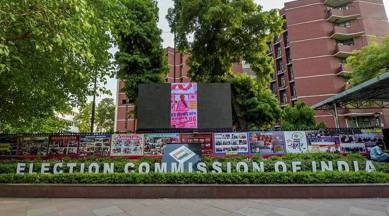Stay updated with the latest - Click here to follow us on Instagram
No statutory bar on bodies with religious names to register as parties, Election Commission tells Supreme Court
The Commission said this in an affidavit filed in response to a PIL by former chairman of the Shia Waqf Board of Uttar Pradesh, Syed Waseem Rizvi, seeking cancellation of political parties having religious symbols and names.

The Election Commission has told the Supreme Court that “there is no express provision which bars associations with religious connotations to register as political parties under Section 29A of the Representation of the People Act-1951”.
The Commission said this in an affidavit filed in response to a PIL by former chairman of the Shia Waqf Board of Uttar Pradesh, Syed Waseem Rizvi, seeking cancellation of political parties having religious symbols and names.
monthly limit of free stories.
with an Express account.
The affidavit pointed out that a Bill was introduced in the Lok Sabha to amend the Act so that no association bearing religious name would be registered as a political party. However, it was not passed and consequently, lapsed with the dissolution of the then Lok Sabha in 1996.
The affidavit said political parties are required to abide by the principle of secularism as mandated by Section 29A of the Act. It added that a political party applying for registration with the EC “must bear true faith and allegiance to the Constitution of India and the principles of socialism, secularism and democracy and to also uphold the sovereignty, unity and integrity of India” and that if the memorandum or rules and registration of the party do not conform to these, it shall not be registered by should not be registered by the Commission.
The EC pointed out that in 2005, it had taken a policy decision to not register political parties that had religious connotations, under Section 29A. It was submitted that since then no such party was registered and that “certain” political parties mentioned in the writ petition were registered prior to that.
The affidavit said the EC issued an order on May 19, 2014, directing that political parties seeking registration should not have religious connotation.
The EC said that “the registered names of the existing political parties having religious connotation have become legacy names, as they have been in existence for decades” and left it to the court to decide whether the names should be disturbed or not. It submitted that the petitioner’s prayer to cancel the party symbols with religious connotations is legally untenable as symbol reserved for a national or state party is strictly based on its electoral performance.